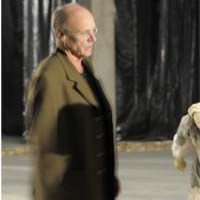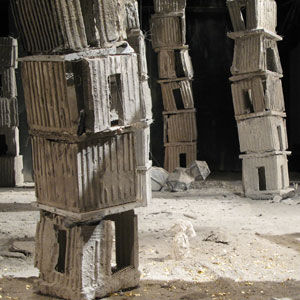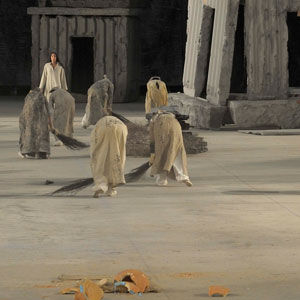Anselm Kiefer prend la scène de Bastille
Anselm Kiefer created the staging, sets, costumes of a remarkable visual and musical performance. Photo: EFE/Arne Dedert.
PARIS.- With a view to celebrating the 20th anniversary of the Opéra Bastille, Gerard Mortier, Director of the Opéra national de Paris, wished to entrust the reknown artist Anselm Kiefer with the entire creation (staging, sets, costumes) of a remarkable visual and musical performance, in association with the composer Jörg Widmann, who wrote the music.
This exceptional commissioned work will showcase the policy Gerard Mortier has been conducting at the Opéra Bastille: that of opening lyric theatre up to other artistic disciplines. For this final production under his guidance, Gerard Mortier wanted to bring about a powerful and remarkable encounter combining stage, painting, sculpture and music. With this musical work of a new kind - one which is both an installation and a performance - he makes his mark by demonstrating the openness of the Opéra de Paris to the interdisciplinary richness of contemporary art. It is not by chance that Gerard Mortier called on the talent of Anselm Kiefer. Am Anfang (In the beginning) extends the artistic exploration the German artist initiated at the Teatro San Carlo in Naples in 2003 with Elektra. After his success with the public with Monumenta at the Grand Palais and the commissioning of a major work - Athanor – for the north staircase of the Louvre's Cour C arrée in 2007. Today, Anselm Kiefer takes possession of the stages and back stages of the Opéra Bastilla with an artistic elegy of (dis)proportionate measure. Conceived in close collaboration with Jörg Widmann, the German clarinettist and composer considered among the most brilliant of his generation, this determinedly contemporary new production reinvents the stage of lyric theatre.
With Am Anfang (In the Beginning), Anselm Kiefer creates a completely new work of art of international breadth, to forcefully take position in the history of art of music. An agnostic pageant, it describes the chaos and annihilation of peoples and civilizations – where the chosen people met with crushing defeat, mistreated by the great powers of the Fertile Crescent situated between Egypt and Mesopotamia. The "Fertile Crescent" is the name given to this region of the world, one of the cradles of our civilization lying between the Tigris and the Euphrates in those times when God seemed to be a vengeful, terrible and arbitrary deity of inexplicable cruelty. Job's complaints and accusations of the Divine therefore have echoes in the three Abrahamic religions.
Dust and debris lie at the foot of twelve stark towers in this haunting landscape. The entire set carries with it a sense of inconsolable despair, in which the words of Isaiah and Jeremy resound with a pitiless relevance to today. Because in the end, isn't History a perpetual series of new beginnings?
A metaphysical work transcended by theatrical illusion, it links the wandering of the Jewish people, incarnated by the Shekhina, to the annihilated ancient empires such as those of Babylon, Jericho, Persepolis, Nineveh...and to the ruins of post-war Germany symbolized by the "Trümmerfrauen", or rubble women, in the same cycle of end and new beginning.
A work, In the Beginning is a production which for the first time in the Opéra Bastille's history takes place on all its stages and back stages. Unimaginable perspectives open up before spectators from the main stage, creating a number of smaller spaces where various actions play themselves out, linked to each other by the words of the prophets and Jörg Widmann's music, the rich melody of which casts its spell. The music indeed provides an infinitely subtle accompaniment to what the artist has to say, such that the rubble of History, like the work of art itself - where all to come has already been faced - is only the beginning concealing the end it holds within itself.
Am Anfang (In the beginning) by Anselm Kiefer will be offered in seven exceptional performances from 7 to 14 July 2009 at the Opéra Bastille. The matinee of Tuesday, 14 July will be at no cost, as tradition requires.
AM ANFANG (AU COMMENCEMENT)
Am Anfang (Au commencement), du 7 au 14 juillet 2009 à l'Opéra Bastille - entrée de 5 à 30 euros. Pour célébrer le vingtième anniversaire de l’Opéra Bastille, Anselm Kiefer a créé une œuvre inédite, réalisation à la fois plastique, scénique et musicale. La fascinante musique de Jörg Widmann interprétée par l’Orchestre de l’Opéra anime ce gigantesque décor de décombres et de cendres. La voix d'une récitante et les acteurs qui l'entourent donnent corps aux récits des livres d’Isaïe et de Jérémie, à travers lesquels nous parvient – du commencement jusqu’à aujourd’hui - la mer toujours recommencée de l’Histoire de l’Humanité...
 Peintre allemand, Anselm Kiefer est né en 1945 dans le Bade-Wurtemberg. Il vit et travaille au pied des Cévennes à Barjac dans le Gard. Après des études de droit, de langues et de littératures romanes, il bifurque pour se consacrer à la peinture. Il passe par l´Ecole des beaux-arts de Fribourg-en-Brisgau et poursuit sa formation à Düsseldorf auprès de Joseph Beuys.
Peintre allemand, Anselm Kiefer est né en 1945 dans le Bade-Wurtemberg. Il vit et travaille au pied des Cévennes à Barjac dans le Gard. Après des études de droit, de langues et de littératures romanes, il bifurque pour se consacrer à la peinture. Il passe par l´Ecole des beaux-arts de Fribourg-en-Brisgau et poursuit sa formation à Düsseldorf auprès de Joseph Beuys.
Ses tableaux sont généralement monumentaux. On y relève notamment les "Dachboden-Bilde", "Au peintre inconnu", "Sulamith", les "Architectures d´argile et tableaux sidéraux", "Das Spiel ist aus", la série intitulée "La vie naît des plantes". L'œuvre d'Anselm Kiefer démarre sur une interrogation capitale: comment, après l'Holocauste, être un artiste qui s'inscrit dans la tradition allemande? Ce travail existentiel de mémoire - et de deuil - s'est élargi d'une quête spirituelle nourrie de grands mythes et de mystique kabbalistique. Pétri de culture, il mêle peinture, photographie, livres et sculptures. Fasciné par le judaïsme, Anselm Kiefer a, tout au long de son oeuvre, exploré le thème de la Kabbale avec la même insistance que celui de la germanité, du cosmos…
Son travail a fait l’objet de nombreuses expositions monographiques au Kunstmuseum de Wolfsburg, Musée d’art Contemporain de Montréal, Hirshhorn Museum à Washington, Metropolitan Museum of Art. Une grande exposition a eu lieu au Grand Palais en 2007. Il a entre autres reçu le prestigieux Praemium Imperial Prize à Tokyo en 1999 et a été élu lauréat du Prix de la Paix par le Conseil de la fondation du Prix de la Paix des Libraires et Éditeurs allemands pour l’année 2008.

/https%3A%2F%2Fprofilepics.canalblog.com%2Fprofilepics%2F1%2F0%2F100183.jpg)
/https%3A%2F%2Fstorage.canalblog.com%2F03%2F02%2F119589%2F96711876_o.jpg)
/https%3A%2F%2Fstorage.canalblog.com%2F11%2F31%2F119589%2F94773502_o.jpg)
/https%3A%2F%2Fstorage.canalblog.com%2F20%2F83%2F119589%2F94772815_o.jpg)
/https%3A%2F%2Fstorage.canalblog.com%2F26%2F72%2F119589%2F75604929_o.jpg)
/https%3A%2F%2Fstorage.canalblog.com%2F59%2F60%2F119589%2F26458628_o.jpg)








/http%3A%2F%2Fstorage.canalblog.com%2F84%2F57%2F119589%2F128729666_o.jpg)
/http%3A%2F%2Fstorage.canalblog.com%2F14%2F07%2F119589%2F126409285_o.jpg)
/http%3A%2F%2Fstorage.canalblog.com%2F19%2F32%2F119589%2F121087755_o.jpg)
/http%3A%2F%2Fstorage.canalblog.com%2F59%2F26%2F119589%2F118154956_o.jpg)